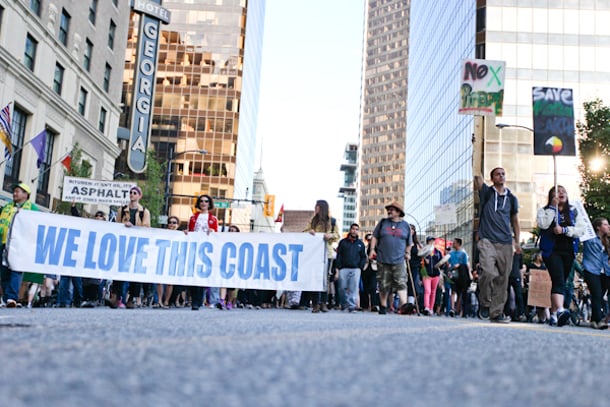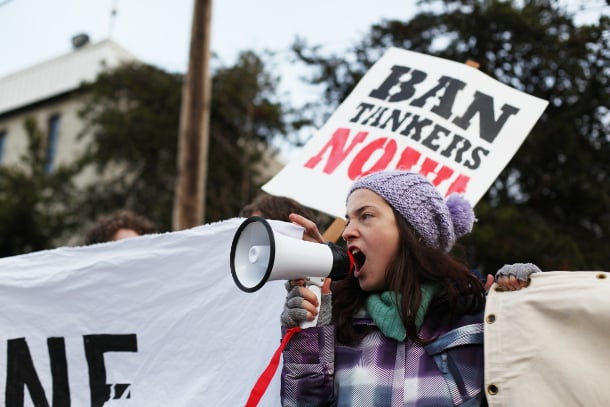A new poll conducted for the Dogwood Initiative to be released Thursday has the federal New Democrats leading in four "battleground" ridings in British Columbia, a result the organization attributes to citizen concerns over oil and security issues.
The Dogwood Initiative is a non-partisan organization advocating for more public control of B.C.'s resources.
The organization recently gathered "tens of thousands" of dollars through fundraising and its 200,000 members to pay for polling as this year's election approaches, according to Kai Nagata, the organization's energy and democracy director. (Nagata is also a former Tyee writer in residence.)
This is the first poll from that effort. It surveyed about 300 respondents by landline phone from each of the four ridings, which include:
• Courtenay-Alberni
• Cowichan-Malahat-Langford
• Esquimalt-Saanich-Sooke
• Burnaby North-Seymour
The poll was conducted by Insights West and has margin of error of plus-minus 5.6 per cent, 19 times out of 20.
All of the ridings have been affected by boundary changes since the last election. But according to Elections Canada, if the 2011 election had been held with today's boundaries, two ridings would have gone to the NDP and two to the Tories.
In all but one of the ridings, the winner grabbed power with fewer than five per cent more of the vote than the second place party. According to the new poll, the NDP now leads by at least 10 per cent in all four ridings.
The poll also shows NDP leader Thomas Mulcair as the preferred choice for prime minister in three of the ridings, while Justin Trudeau leads in Esquimalt-Saanich-Sooke, despite the poll showing no higher than 12 per cent of support for the Liberals in any of the four.
'Emotional election issues'
Nagata said the ridings were traditionally battlegrounds between the NDP and Conservatives, but that issues such as oil tankers and government surveillance of citizens seem to be pushing voters away from the Tories.
"We think that's correlated to the fact that [the Conservatives] are offside with the majority of constituents on a number of pretty key, hot-button, emotional election issues," Nagata said.
The New Democrats have supported banning oil tankers on the B.C. coast, and have aggressively opposed Bill C-51, also known as the Anti-Terrorism Act. Critics say the bill gives the federal government too much power to monitor Canadians, with insufficient oversight.
Nearly three of five poll respondents in each riding said they were concerned about government surveillance. Between 59 and 66 per cent, depending on the riding, believed oil tankers on the coast offered no benefit to B.C.
Mario Canseco of Insights West said that respondents were asked who they were voting for before they were asked about issues like tankers and surveillance.
Telling result in Burnaby North-Seymour?
One of the poll's most telling results, Nagata said, is that of Burnaby North-Seymour -- the riding created in the 2011 changes -- which the Conservatives would have won in 2011 with 44 per cent of the vote.
The poll shows the Tories now have 15 per cent of the riding's support, with the New Democrats at 35 per cent. The Greens take second place at 19 per cent.
Nagata suggested that the centralization of power within political parties, along with the growing influence of the east and Alberta power centres, have left British Columbians feeling slighted.

"There's going to be a disconnect with what people value in B.C. with these issues, and an obvious one is the oil tanker issue," Nagata said.
Two major pipeline projects that would ship oil to the coast for export via tankers are currently proposed for the province. They face fierce opposition from First Nations, environmental groups, and other residents.
In September 2014, NDP MP Nathan Cullen introduced a private member's bill that would ban oil supertankers from B.C.'s north coast.
Nagata added that British Columbians appear to be developing malaise toward politicians.
"Being this far from Ottawa, people feel maybe a little less blind loyalty to our institutions, and more like we're on the receiving end of some pretty nasty government policies over the last few years," he said.
He said that despite oil tankers being a pivotal issue in the upcoming election, the Green Party does not appear to be making gains in the ridings polled.
The Green Party has said it would ban supertankers on the coast, and later phase out bitumen-diluent tankers in the Port of Vancouver. ![]()
Read more: Politics, Election 2015















Tyee Commenting Guidelines
Comments that violate guidelines risk being deleted, and violations may result in a temporary or permanent user ban. Maintain the spirit of good conversation to stay in the discussion.
*Please note The Tyee is not a forum for spreading misinformation about COVID-19, denying its existence or minimizing its risk to public health.
Do:
Do not: